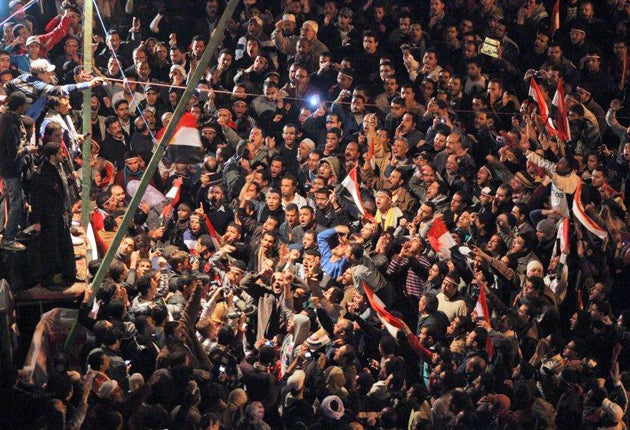Protesters: 'He's toying with us. I don't think anybody is going to accept this'
They came to Tahrir Square expecting change. Then Mubarak spoke...

An agonised sense of disappointment swept across Cairo's Tahrir Square last night as the protesters who have turned out every day for more than two weeks listened to the announcement that they desperately hoped would mark the downfall of their hated dictator; instead it confirmed his continuation in power.
As more and more people joined the crowd last night, bringing the total to at least 100,000, chants of "We're almost there, we're almost there" echoed around the square. Later they returned to a more familiar cry: "Leave, leave, down with Hosni Mubarak."
Their hopes had been dashed by Hosni Mubarak's defiant promise to continue in power until the next election – his best offer to the protesters being some constitutional change and the proposal to delegate powers to his Vice-President, Omar Suleiman. Mr Suleiman later embraced that concession, saying that he was committed to achieving the people's demands, and urging the protesters back to their homes and their jobs.
Mr Mubarak began his speech by saying he was "proud of this new generation that is asking for a better life," and promised to punish those responsible for violence against them. He blamed foreign powers for fomenting the trouble that has convulsed the country. But the crowd appeared unconvinced. Some cried and waved their shoes in the air in a sign of contempt. "It's a shocking speech, he's given us nothing," said Mohammad Riad, 26, an accountant. "He is not interested in us. We say to him, please leave. He's crazy."
Samar al-Safey, a credit analyst, called the speech "nonsense". "He's toying with us," she added. "I don't think anyone is going to accept his speech."
Despite the anger, there was little sign of impending violence in the aftermath of the president's speech, as the deflated protesters filed quietly out of the square that had earlier resounded to their demands for change.
Their optimism had been fuelled by the Egyptian military's promise that "all your demands will be met today". Fears that the promise would be broken turned to a horrible certainty when the President confirmed that the outcome would not be the immediate transition to democracy that the protesters so passionately desired.
One theory had been that Mr Mubarak would hand over fully to Mr Suleiman. But it was not immediately clear whether the limited handover that was announced was acceptable to the Egyptian military, which had shown every outward sign of having taken at least temporary control.
As Mr Mubarak prepared to address the nation, the Army announced it was taking steps "to maintain the homeland and the achievements and the aspirations of the great people of Egypt".
The female State television presenter faltered as she said in a news bulletin that Mr Mubarak would speak "live on air from the presidential palace". The announcement followed 48 hours in which the protests had expanded into a nationwide wave of strikes and protests. And it came on the eve of another "day of millions" in which mass protests against Mr Mubarak had been expected to reach yet another peak in Cairo, Alexandria and other cities.
Whether last night's events will deflate or inflame those protests remains to be seen. It had seemed as if they would be unnecessary. In a drama-packed few hours, State TV broadcast what, in a possible hint that the military intended to assume power, at least temporarily, it called "the first statement of the Supreme Council of the Armed Forces".
The Supreme Council's meeting was televised for the first time since the 1967 and 1973 wars with Israel. Viewers were told that the meeting would "convene continuously to look into what measures and procedures need to be taken to maintain the homeland and the achievements and the aspirations of the great people of Egypt".
An almost equally sensational intervention was made by Hossam Badrawy, newly appointed Secretary General of the ruling National Democratic Party as Mr Mubarak had tried to convince his own public and the international community that reform was under way.
Mr Badrawy, a relative liberal who is seen as reform-minded by Western diplomats, told The New York Times: "I hope [Mr Mubarak] would say that he has respect for the people... I hope this heads to early elections."
While that hope was not to be fulfilled last night, the protesters appeared in no mood to give up their cause. "Hosni Mubarak does not understand the people," said Ehab Galal, 33, a hotel manager. "Everyone here is asking him to leave. We will not stop; we will continue and tomorrow we will beat him."
Join our commenting forum
Join thought-provoking conversations, follow other Independent readers and see their replies
Comments